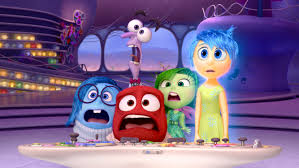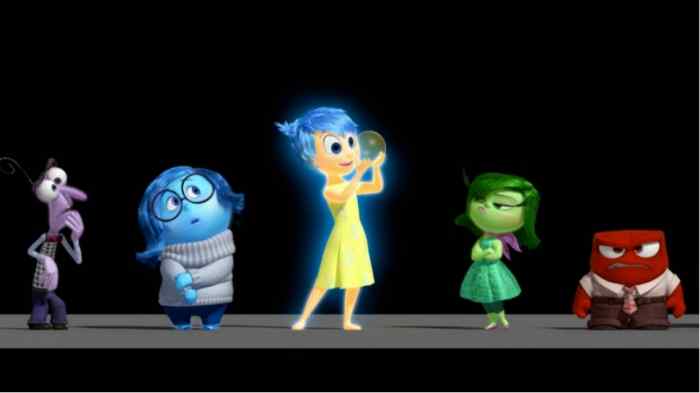Inside Out and St. Thomas Aquinas’ Philosophy of the Emotions
What does a colorful animated film and the writings the greatest philosophical mind of the Catholic tradition have in common? “Nothing,” most would say. Casually considered, the Pixar film exploring a little girl’s mind, and the discussion of the human soul in the Summa Theologiae have nothing significant connecting them. A more discerning mind, however, may recognize some consonance between the two. Both discuss human emotions, though their methods certainly don’t suggest any strict correspondence. Indeed, though each understand differently the role of the emotions in human flourishing, both, nevertheless, come to a remarkably similar conclusion with respect to the emotions’ propensity for harm and for good in the human person.

Emotions in the Summa Theologiae
St. Thomas Aquinas, in the Primae Secundae Partis of the Summa (questions 22 and 23, to be precise) gives the most comprehensive account of emotion and its role in the human person out of anyone in the tradition. He calls them “passions of the soul”–passions in the sense of being acted upon by something, as opposed to actively bringing something into being. That is, the essence of an emotion consists in a response to something. It begins with something acting upon the agent, it is not something the agent initiates. He acts in response to something outside of him, to things that impress upon him from the outside world. They are responses to something done to us, rather than something we do proper.
Division of the Emotions
An emotion, St. Thomas says, belongs to either the “concupiscible” or the “irascible” appetite. The one refers to the difficulty in attaining the desired object, the other as to whether the object is perceived as good or pleasurable. To the concupiscible appetite belongs six emotions, Love and Hate, Desire and Aversion, Pleasure (Joy) and Pain (Sorrow). To the irascible belongs Hope and Despair, Fear and Daring, and Anger. All others we might consider casually as “emotion”, he would say, are but fine shades of the primordial eleven here described.

Relation to Reason
Now, it seems evident St. Thomas would not give the emotions the primacy of place among the human faculties, but what role does St. Thomas give the “passions of the soul” in determining one’s personality and indeed, who one is as a person? In the first place, following Plato and Aristotle, he divides the human soul into the “intellectual” part and the “sensitive” part. Now, the “ruling principle” of the human soul is reason, found in the intellectual part. Reason is where one finds the imago Dei (the “image of God”): man rules himself through reason, unlike the lower animals who are moved by their passions. Emotions belong to the sensitive part of the soul. Therefore, emotion must be subordinate to reason.
However, it must never be thought that St. Thomas condemns the emotions. They are indeed subordinate to reason, but since man is body and soul, the emotions, and emotional responses, are an important component in reaching his final end. Emotions are not bad; they become bad when they supplant reason and control us, instead of us controlling them. Properly ordered, emotions are of vital importance in leading man to love what will bring him to his final end, and shun what will impede the consummation of that end. Reason needs to restrain, temper, and order them to their proper objects, but since man is body and soul, they, therefore, are integral in leading him to his final end. Emotions must be educated, be subject to reason so that man may love and desire what he ought–but never denied outright.
Emotion as Prior to Reason?
The film Inside Out presents an account of the emotional life of the person that, again, appears to have little to do with the account given by St. Thomas, and yet enough similarity to warrant a closer investigation. In the film, there are five emotions that, essentially, determine all aspects of Riley’s personality: Fear, Anger, Disgust, Sadness, and, the ringleader of them all, Joy. As such, they help form what sort of memory her core memories will be, which in turn form the primary determinants of her personality, in turn determining her overall health and well-being. However, her emotions are not wholly in charge: unlike a Shelley or a Byron, the film does not imply that all emotional outpourings are good, or even healthy. Rather, some sort of balance must be maintained among them if Riley is to feel and respond to the world as she ought.

The proper balance seems to imply some sort of rational control with regard to emotional responses. After Joy and Sadness are lost in the deep recesses of Riley’s mind, the other three find themselves tasked with somehow maintaining Riley’s equilibrium without Joy–a task for which they prove ill-qualified. The scene with her family at dinner best exemplifies the importance the film places on the balance and the tempering of emotional responses, with the conspicuousness of its absence. Without Joy holding everything together, she gives listless non-answers to her mother’s queries, and explodes at her parents with no real provocation. Without Joy, her other emotions are helpless to respond to a tense situation, turning what may have been your standard bad day during a tumultuous time of life into an unmitigated disaster, both for Riley and for her parents. The emotions may be more important here than they were to St. Thomas, but, nevertheless, they still must be tempered by some extra-emotional balance.
The Balance of Reason and Emotion
The conceptions of the human psyche presented by St. Thomas and Pixar seem absolutely disparate, mainly regarding the place each gives to the emotions. Inside Out seems to regard them as the primary determinant of personality and action–something with which St. Thomas and the tradition would vehemently disagree. In that sense, the film follows the modern and Romantic conceptions of the human person and the role of emotion, which say that emotion is “higher than reason,” than the classical and Christian tradition, which says that it is reason that truly makes us human. But such a judgement might be overly hasty. These differences do not mean that the two accounts, the fictional and the philosophical, are in conflict with one another. Indeed, they are remarkably consonant.
How so? Both accounts agree that some kind of balance must be maintained among the various emotions. No one emotion is allowed to have the unbridled reign to subsume all other functions of the passions and intellect in the abundance of its outpourings. Such non-rational emotionalism, as demonstrated by both St. Thomas and the film, prove destructive to the flourishing of the human person. For St. Thomas, when one gives the passions precedence over one’s reason, he becomes enslaved to his appetites, and thus diminishes the image of God within him. In Inside Out, when Riley’s more negative emotions are by happenstance placed in charge, she finds herself unable to cope with her stressful situation, through which she embarks on a mad flight to get back to her old home, and almost shuts down emotionally.

Clearly then, there must be some levee for the wave of passion. For St. Thomas, this levee is reason. Reason is what tempers the responses of the “passions of the soul,” so they we may respond to what we encounter, drawing towards it or moving away from it, in the way that we ought. For Riley, it is Joy that tempers the different emotions, causing them to work together in such a way that allows Riley to feel what she needs to and respond to her environment in the proper way. One may object that, coming from the Thomistic framework, a mere emotion is impotent to maintain a proper equilibrium in a human person. If Joy is understood purely in the Thomsitic sense outlined above, such an objection would have some merit. But, though joy as an emotion is present in the Thomistic framework, Joy in the film seems to encompass more than what St. Thomas would consider as belonging to the emotion, because the Joy it presents includes more than the mere pleasure indicated by the Summa. Rather, it is something more akin to the eudaimonia of Aristotle (activity of the soul in accordance with virtue over a complete life). Joy maintains the balance of the passions and intellect of Riley, though, unlike St. Thomas, the primary focus is upon her emotions. Joy is the linchpin by which Riley’s emotional equilibrium is sustained.

In either case, both accounts maintain that some rational balance must be maintained in order to have a virtuous person, or at least a happy person. Both agree that emotional responses cannot be totally unbridled, but there must be some sort of limitation, something tempering the emotional responses which is more than emotion, but does not reject them. While different in each, both agree in that such a ruling principle is what is needed in order for one to fully be human.
What do you think? Leave a comment.











Kids are natural philosophers. They never stop asking the key philosophical question: ‘why?’
Sadly we often shut this tendency down.
That’s a tough point to make as many children do not have the emotional maturity or background knowledge to really understand certain ideas.
Follow the though process of this:
“Where’s the Dog?”
“The dog is dead?”
“Why?”
Or even more potent “Why did the dog have to die?”. This is not a conversation that will get very far without bending truths or omitting facts. Sometimes the easier and more productive answer is “just because”.
I appreciate the idea of exploring children’s thoughts and ideals, but this does not make them philosophers. Nor does it make the adults that don’t try to push constant new ideas onto them bad people.
That’s an interesting point you make regarding why asking “why” doesn’t equate to philosophy. Although, while there is clearly some frivolity involved in the idea that kids are our best philosophers, I do think there is some serious truth to it as well. I have a pretty strong reaction to the idea that we should ever tell a child “just because.” I think that promotes a willingness, subconscious or not, to cut our curiosity short. Kids are no different from adults in the fact that they can not understand certain ideas. We are all far from our potential understanding at any given moment. The fact that kids (though not intentionally) realize their limited knowledge and aspire to find out a further more penetrating truth to their inquiry is in fact very much what the philosopher is attempting to do when they ask why. Philosophy, to me, is not problem solving, it’s problem mining. It’s going to unexplored regions of thought and finding problems we didn’t think of yet. The problem solving is mathematics or logic. But I guess we all have our own interpretations of such things!
Asking why to everything does not make you a “natural philosopher.”
The Artifice should do this type of film/philosopher combo more often. It is a good feature, and even better in my opinion, if it focused on film/animation releases that are current/recent.
I say well done!
Watched it with my eight year old daughter and we both enjoyed it. Having a philosophy background made me very interested in how Pixar handled the complexity of self, they managed brilliantly, not simplifying too much, but managing to make it all blend well with the story. It was tremendous fun, while being moving, and most importantly my daughter and I talked about feelings all the way home.
I also went with my 8 year old and think that is the ideal age for the film as they are old enough to be well aware of their competing emotions. I think 5 would be too young to really understand it.
Great job connecting Aquinas’ comprehensive thoughts on emotion with Inside Out. It’s intriguing how the two dovetail, especially with the representation of Joy within Riley’s psyche.
Love your article even more than the movie.
This Pixar An. is nowhere near as interesting as many many coming of age films that have been released in the last 50 years. I could pick 30 that have more substance.
I find it a little absurd that we are talking on this level about such an average film if you compare it to many children’s films – See Mark Cousins ‘A story of Children in Film’ which provides perhaps a few ideas for films to watch – old and new. Of course you have historical films like 400 blows, Ivan’s Childhood, Kes, Oliver Twist, Bicycle Thieves and so on that actually involve children into the real world.
I was surprised at how clever the film was and really enjoyed the way they presented the picture of the self. The emotional impact, however, was a bit much in places for my 4 & 6 year old who had a good old blart. Excellent film.
The plot is very close to home for me.
Sounds more like the realm of psychology than philosophy?
Brilliant!
Kid’s films are so intellectually and emotionally superior to most so-called adult films these days it would be a shock, were it not for the fact that kid’s literature is 1000x better than schlok like Dan Brown and Fifty Shades….
Inside Out kicks the crap out of Inception and then just goes on kicking. I’m biased though, I watched it with my daughter, and we were both physical wrecks by the end.
Anything labelled “adult” is for the immature.
One of the best animated films I have ever seen, up there with Antz, The Incredibles, Toy Story trilogy, Wall-E & Up. Not to be missed.
Great article. This is the insight that makes for a stimulating read.
Took the youngest (she’s 6) and we both loved it.
Although neither of us could hold back a tear or two on the Bing Bong moment (I won’t elaborate in case you haven’t seen it!)
Film philosophy is a great and burgeoning field that can evidently be accessible by many who find the analytical/more metphysical stuff too confusing. Film lends itself beautifully to thought – and there is always room for it to go deeper.
Watched it Yesterday with my 7 yr old, I loved it, he laughed.. not quite sure he understood it all though.
This is brilliant. Coming from a 38 year-old who recently finished 18 months of excellent NHS counselling for depression.
My experience has been that the most widely accepted theory is some form of positivistic reductionism. The dilemma is inherent in the presentation and in speech and even you seem unable to avoid this with your claim ‘it is made up of various different, often competing impulses.’
It is difficult to say the behaviour of people is the result of competing ‘impulses’ because it needs to be understood that ‘impulses’ are not things i.e. not definable, not quantifiable and have to be falsely shaped to be talked about at all.
Understanding what is being said when people use the terms self, reality, knowledge etc is complex and seems to be as you say ‘counter-intuitive’. A hundred years on from Wittgenstein most academics seem to have no or the wrong grasp of the issue and I really do not believe the film will help with its solid characters — I can’t see how we can get away from scientism or positivism.
Our modern culture is lacking real commitment when it comes to exploring themes especially in animation/film – especially in our world right now at this moment.
The thing is the cartoon is written to be understood. A lot of writing in (later) philosophy is uneccessarily opaque. So it’s no surprise smart people produced a smart production. They weren’t trying to protect their little corner of academia.
I really enjoyed this article. I think you managed to articulate your argument extremely well and Inside Out is a movie that can be analyzed through a philosophical lens, as well as a psychological one, and many tend to focus on the psychological side more than the philosophical. It’s nice to see the movie viewed from a different lens.
My mind’s got a mind of its own!
It was eye opening. Very sad (lots of sniffles around, bring a box of tissues), but also incredibly funny. A wonder.
I really enjoyed the take this piece has on the film and St. Thomas’ philosophy. It was definitely interesting to note the way Pixar addressed the idea of the self and how you apply the philosophy to the film.
This is the kind of article I enjoy reading because it looks at complex ideas in a more accessible way.
Thanks for a great article.
I got to show this article to my family!
Love this. Inside Out was such a fantastic film, and I think the most perfect visual representation of our emotions and how they impact our engagement with the outside world.
At the end of Pocahontas my 6 year old was crying and said, “I am not Pocahontas, but I feel so sad for her.” We can now talk about deeper concepts than just a year ago. Your write-up of Inside Out insured that we will watch it soon on “movie night”, and has provided many points to bring up when we discuss the story. Many thanks for your insights.
This was really interesting. Thanks! I loved Inside Out. I saw it with a gaggle of pre-teens I was supervising for a summer camp, but I probably enjoyed more than any of them. The relationship with emotions we all face is real and the personification of which can resonate with anyone in any time period. That’s the beauty of it!
I love this article. I believe it is well written and it shows an interesting relationship between the philosophy of St Thomas and the film Inside Out.
I loved how this movie represented depression as feeling nothing rather than just plain sadness.
Emotions and relationship… Nice work
Love this article. I’ve watched this film a couple times and was so impressed at how they managed to play with the complex notions of human psychology in a way that children could understand.
I saw it with my 4 year old cousin. I think he liked it mostly because of the cute cartoons and the humour but I found it really sweet. I liked how the film validated feelings and demonstrated that depression (sadness) is in fact an emotion and not a form of attention seeking or exaggeration.
Really enjoyed this! Thanks for sharing.
Children are the best philosophers, yet we often do not appreciate their thirst for knowledge. Constantly asking “why” is so important as it forces us to really strip the layers of issues.
When I first saw Inside Out, I was really surprised and delighted by Riley’s complete lack of agency as a rational and autonomous being. I remember I went into the theatre expecting that Riley herself would end up gaining some control over her emotions in the end, but she really didn’t at all. And I thought that decision to deny Riley any means of interacting with her emotions was a really smart way showing that Riley is her emotions. And in that sense, the film I think makes a very compelling argument that even the act of achieving inner emotional balance is, in itself, an emotional act rather than a rational act.
So it’s really interesting to hold the film, as you have done, next to someone like St. Thomas who argues that emotions should be subordinate to reason. That kind of comparison certainly shows the lack of interaction in the film between Riley’s emotions and some kind of separate notion of intellect or reason. But even if Inside Out and St. Thomas disagree on that point, you articulate very well how both Inside Out and St. Thomas agree that the goal should be balance. In Inside Out, that balance is achieved through the emotions’ ability to self-regulate, whereas St. Thomas finds that the emotions need to be regulated by the intellect.
I love Pixar, but Inside Out has brought out so many thoughtful discussions about the mind, psychology and how we thing, reason and feel.
Great article.
For me, I found that the movie did a good job of appealing to a range of audiences without trying to talk down to children.
Really interesting discussion! Genuinely I think Inside Out is one of Pixar’s best, as it shows how complex the human mind is even for a child! Good article 🙂
The themes on reason and emotions I thought were also very pervasive throughout the movie, but I never would have thought to compare it Aquinas. Great article!
Love the idea behind this article, very funny and thought provoking. I also appreciated the insight that Inside Out totally doesn’t have an “account” for reason inside us in any explicit manner. I have to watch it again now!
Inside Out is to me the most important movie that Pixar has ever made, and they couldn’t have released it at a better time than they did.
For many reasons, I have a feeling that 2015 was an emotionally turbulent year for a lot of up-and-coming youngsters at the tail end of Gen Y.
Without getting into detail about all the political, racial, and economic stuff going on then, I generally remember being taught, implicitly or otherwise, to suppress my negative emotions about everything in favor of a persistent positivity. Speaking from personal experience, it was kind of intimidating trying to socialize in environments where you feared being isolated because you gave off the wrong jubies, or where you felt inferior for having these negative feelings in the first place. I suspect I wasn’t the only one.
In this sense, I think Inside Out spoke to a lot of people, particularly the scene where Riley lost the ability to feel anything after shunning her personal right to sadness again and again. And the final conceit that emotions work best together is illustrated through what I feel to be a beautiful metaphor.
To tie this better into the article, I believe FilmCritHulk said it best when he said that “REASON IS NOTHING MORE THAN THE LEVEL OF COHERENCE BETWEEN OUR VERY REAL EMOTIONS.”
I mean, people will argue this point back and forth, but as a work of art that provides catharsis if only in the here and now, I think it’s kind of a beautiful message.
Anyway, that’s my piece. Great article ha ha. It’s funny because I’ve been thinking a lot about spiritual stuff recently, in relation to the emotions. Everything from Buddhist Psychology to Aquinas’s treatises on the nature of the universe shed a surprising amount of light on the nature of humanity. I mean, speaking as a person who didn’t take religion seriously until recently, there is a surprising amount of overlap between what doctrine says about the soul and what the sciences say about our the workings of our psyches.
An interesting take on this movie! Thanks for sharing. +++
I would never have thought to connect Inside Out with Thomas Aquinas. I guess that punches a hole in the common argument that animated movies are “kids’ stuff,” doesn’t it? In all honesty though, why aren’t we as adults taking animated movies more seriously? In my humble opinion they have much to say to people of any age.
This was a fantastic introduction to Thomas Aquinas’ thought, and very informative to me! I would love some sort of follow-up to this article, but I doubt you could find many other animated films that connected so effortlessly to Thomism, ahahhah.
Very interesting article!
I loved the movie inside out! I thought it was such a great start to discussing more hidden topics such as mental health. And also you really feel and experience what Riley feels in the movie. You watch her grow to a memories which was great as well.
I would like to talk with you. There are aspects of st. Thomas writing which I have problem with… he has a problem with… how important is emotion in furnishing personality. I think you would understand more if you were to think of a psychopaths psycho structure… There is no emotion, none. And that would bring one to the realization of why is emotion so important to form a personality.
A good essay. I just showed this essay to my colleague in the office next to mine who is head of our Philosophy program and he’ll be reading it. I had not thought of St. Thomas in terms of a movie I absolutely enjoyed watching with my youngest daughter.
Nice to know that there is some philosophical consistency.
I was wondering if the movie made some points unclear, and maybe there where lies the main difference with St. Thomas’ ideas: Who’s deciding? Those little things inside my mind? Who’s making the balance? Joy? But what about me? What I am doing? But what would represent “I” then? My mind has things; do those things have their little minds? And if so, do those little minds have little things having minds in their turn? Are our actions determined by those things? Or is there a will behind our actions? If so, what represents it, and can I call it my will or the will of those little things called emotions? Etc.
Recently I was reading about biases and informal fallacies, and only now I found an informal fallacy that reminded me of the wonders I raised in my first comment. The fallacy is called the “Homunculus argument”.